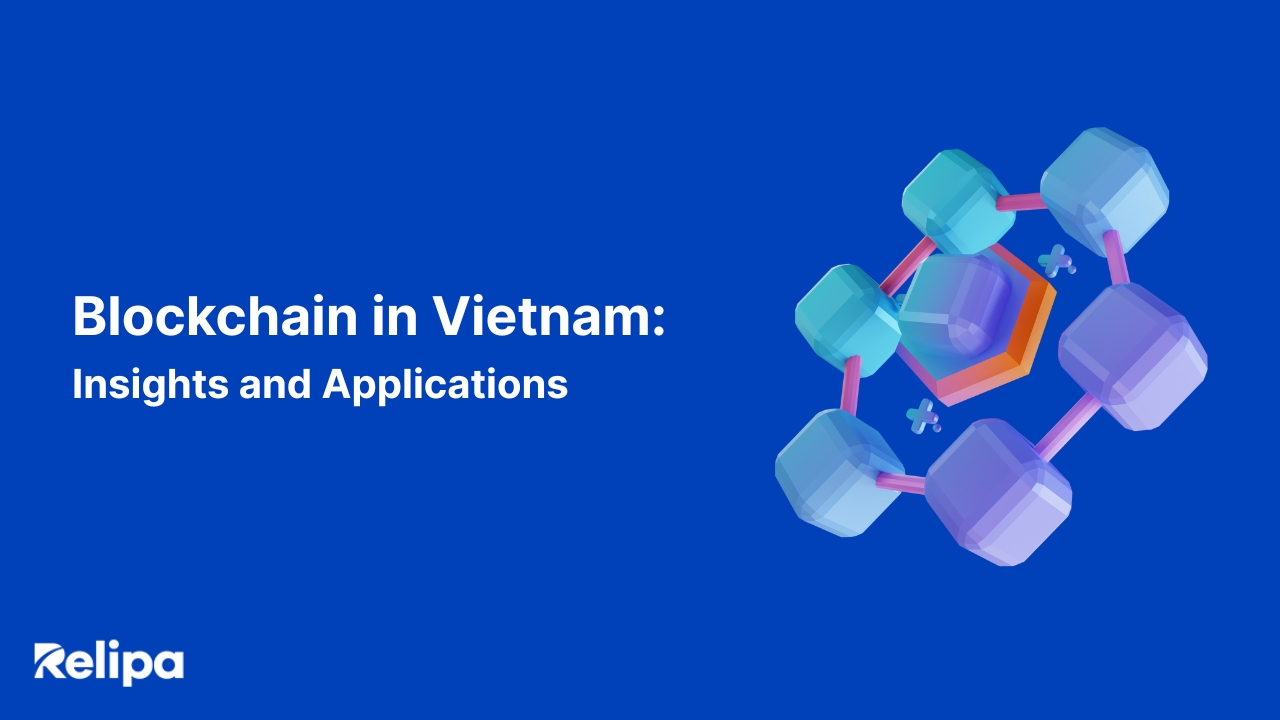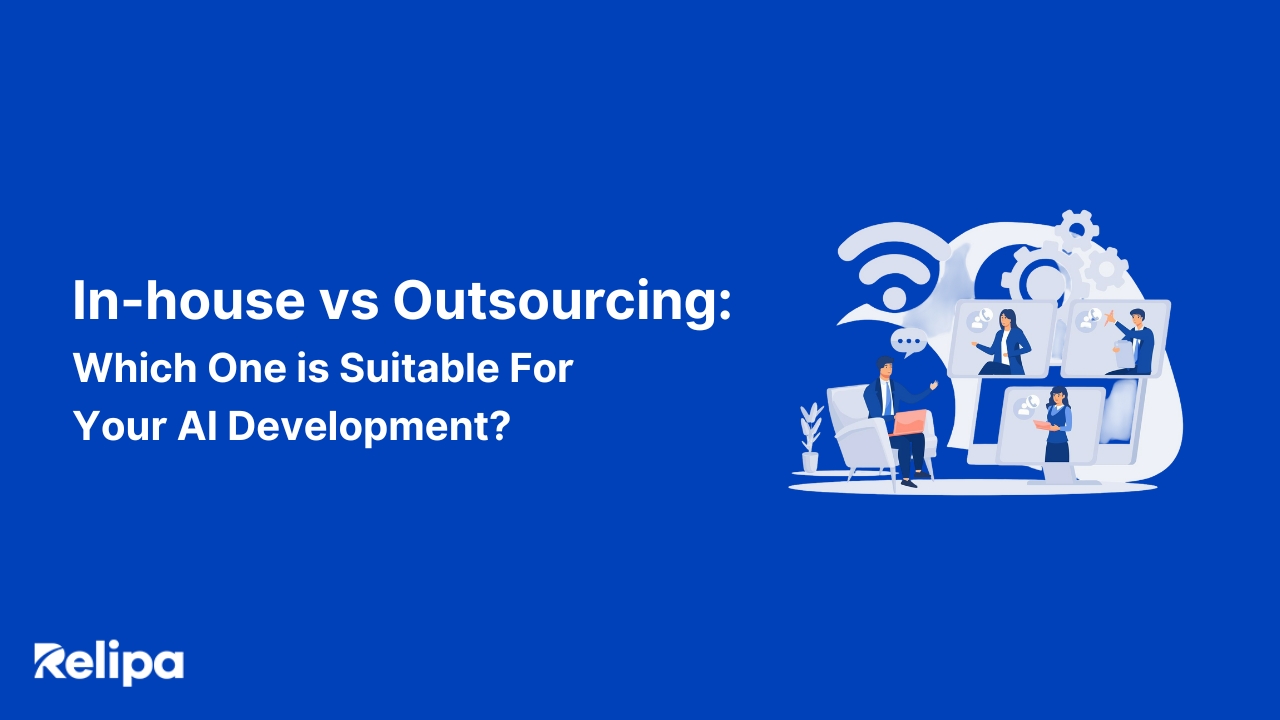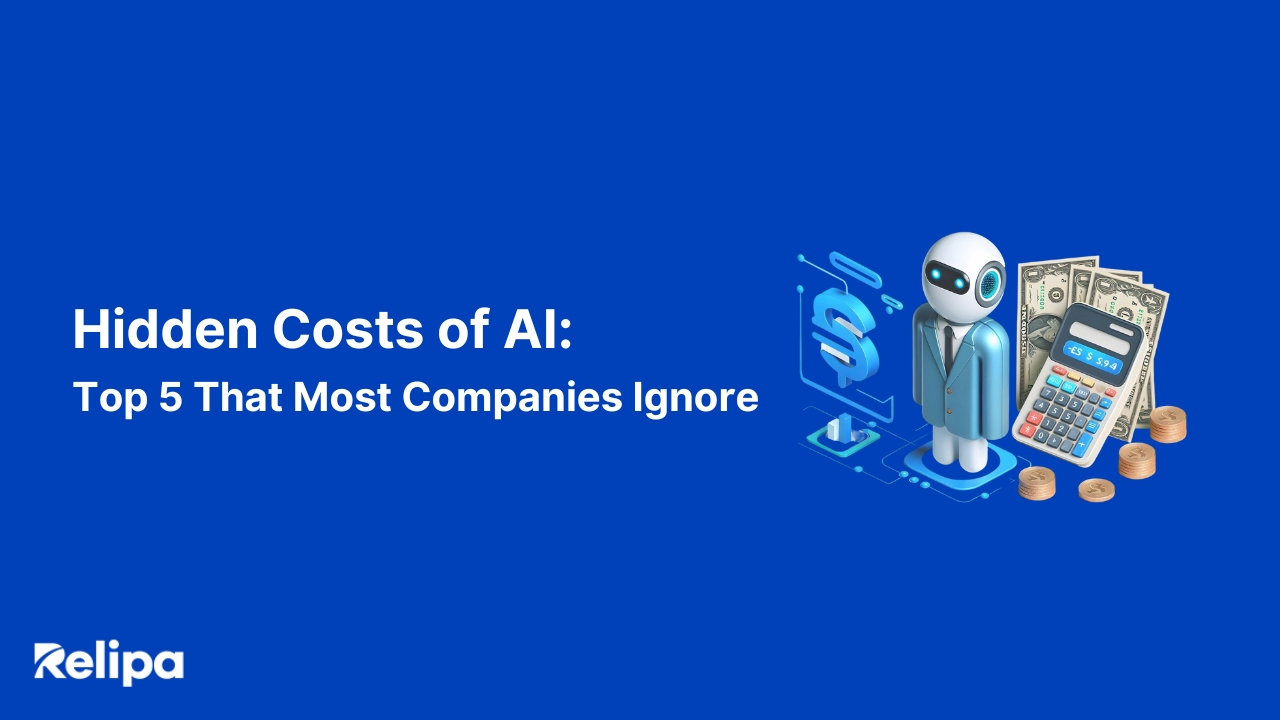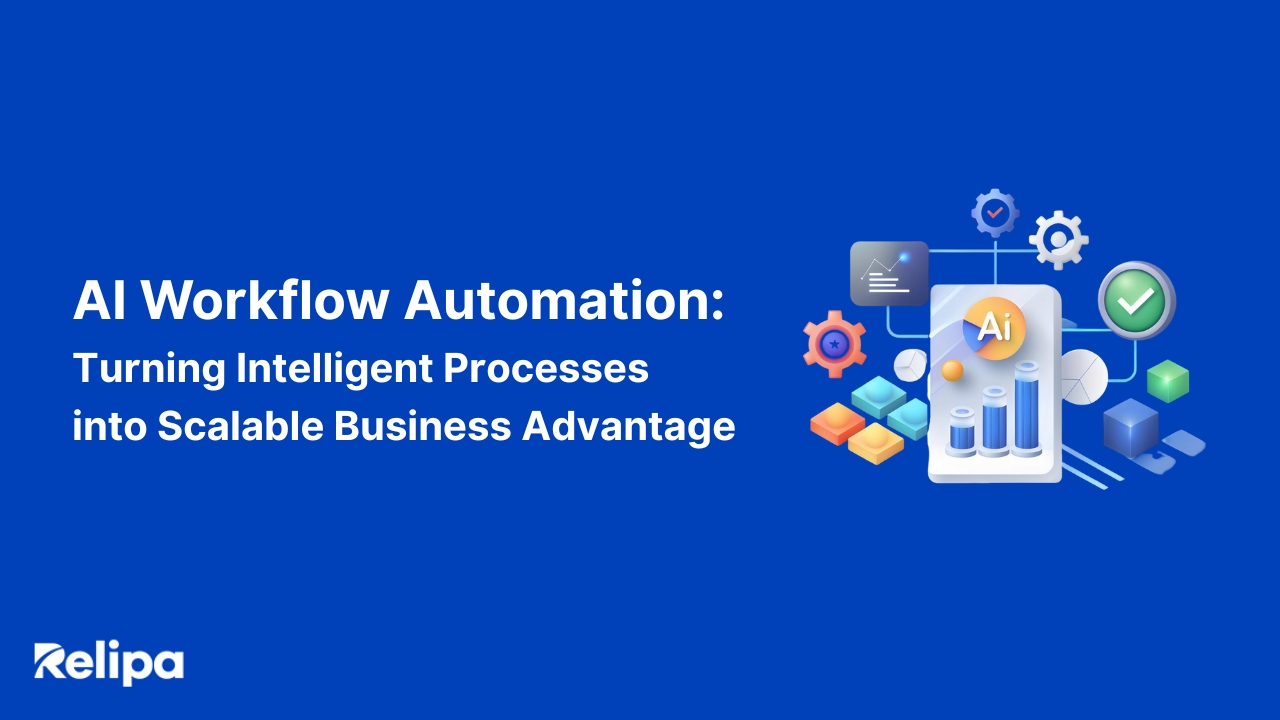Blockchain In Vietnam: Insights And Applications
Blockchain in Vietnam is no longer a niche topic reserved for cryptocurrency enthusiasts. Farmers are using it to prove the origin of their crops, game studios are building entire virtual worlds on it, and hospitals are testing it to safeguard patient records. These everyday experiments show how an abstract technology is steadily finding real meaning in daily life.
At the same time, blockchain in Vietnam feels like a gaining momentum. Developers are eager to experiment, startups are pushing boundaries, and industries are seeking greater transparency and trust. What once sounded like a buzzword is now turning into tangible solutions, and Vietnam is emerging as one of the most exciting places where the future of blockchain is being written.
Read more: Top 5 Blockchain Countries in Asia
In this blog, we’ll take a closer look at the current blockchain landscape in Vietnam, highlight key applications across industries, and explore the opportunities and challenges that lie ahead.
The Landscape of Blockchain in Vietnam
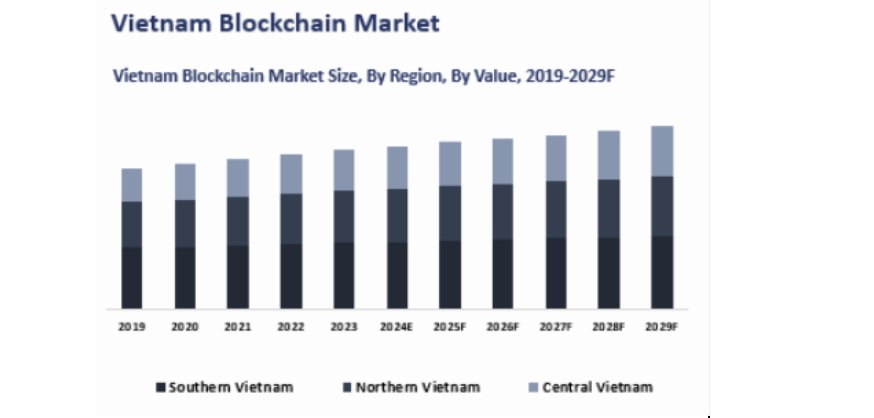
Source: TechSci Research
Market Size and Ecosystem
The Vietnamese blockchain market has experienced rapid growth, with recent estimates valuing it at around USD 350 million. This expansion is fueled by the country’s ongoing push for digitalization, strong adoption of fintech services, and the government’s commitment to building e-government solutions. Blockchain is increasingly seen as an enabler of Vietnam’s broader digital economy, which aligns with its ambition to become a leading digital hub in Southeast Asia.
Hanoi and Ho Chi Minh City, in particular, are emerging as innovation hubs, where blockchain startups, incubators, and investment funds converge to experiment with new business models. The dominance of these cities stems from their strong technology infrastructure, business environment, and access to skilled IT professionals.
Beyond the startup scene, public awareness and adoption of blockchain-based services have grown significantly. Vietnam consistently ranks among the top countries worldwide in cryptocurrency adoption, reflecting both the population’s openness to digital assets and the appeal of blockchain-driven opportunities. However, regulation has not kept pace with this enthusiasm. While the government has shown willingness to foster innovation through pilot programs and sandboxes, a fully comprehensive legal framework for crypto assets and blockchain applications is still evolving.
Government Strategy and Regulatory Framework
Vietnam has taken a proactive stance in shaping its blockchain future. In 2024, the government announced the National Blockchain Strategy (2024 – 2030), a comprehensive roadmap that aims to make Vietnam a regional leader in blockchain innovation. Rather than treating blockchain as a niche technology, the strategy envisions its integration across all socio-economic industries, from finance and education to healthcare and logistics. This marks a shift from viewing blockchain purely through the lens of cryptocurrencies to recognizing its potential as a backbone for digital transformation.
The strategy sets out several clear objectives. It prioritizes the development of national blockchain infrastructure that can support large-scale applications, while ensuring compliance with cybersecurity and data protection laws. It also places emphasis on talent development: universities and research institutions are encouraged to integrate blockchain into their curricula, preparing the next generation of engineers and policymakers. In addition, the plan includes establishing innovation centres and regulatory sandboxes to give startups and enterprises a safe space to test new solutions under government oversight.
One of the most notable milestones has been the launch of NDAChain, a government-backed national blockchain platform. NDAChain is designed to serve as a trusted infrastructure for secure digital identity, data traceability, and authentication services. Its applications are expected to cut across industries such as healthcare, finance, education, and logistics, helping institutions enhance transparency, reduce fraud, and meet compliance requirements. The move signals Vietnam’s intent to not just regulate blockchain but also to actively invest in and deploy it.
Challenges of Blockchain in Vietnam
Although Vietnam is emerging as a promising blockchain hub, several obstacles continue to hinder large-scale adoption. Regulatory uncertainty remains the biggest challenge. While the government has introduced a National Blockchain Strategy (2024 – 2030) and passed the Law on Digital Technology Industry (2025), the legal framework for crypto assets, tokenized securities, taxation, and cross-border transactions is still incomplete. Businesses often lack clarity on what is permitted, what is permitted, what requires licensing, and how compliance will be monitored.
While Vietnam has a large pool of young and skilled IT workers, specialized expertise in blockchain development is still limited. Knowledge of advanced areas like cryptography, consensus algorithms, and governance models is concentrated in a small community. At the same time, it has drawn attention to the importance of developing human capital. The shortage of qualified talent is now pushing universities, companies, and government programs to explore ways of building a stronger pipeline of blockchain experts for the future.
Blockchain Talent in Vietnam
Overview
Vietnam’s young and tech-savvy population has long been a strength in the country’s digital economy. With over 57,000 IT graduates every year, the foundations for emerging fields like blockchain are already in place. Many developers are self-taught and eager to experiment, which has helped fuel the rise of local Web3 startups and global successes like Axie Infinity.
Talent Development Today
While blockchain expertise is still developing, this gap has opened space for rapid growth. Demand for blockchain engineers is high, and universities are starting to respond. Programs such as the Basic Blockchain Course for Lecturers (organized by Cardano2VN and the University Blockchain Alliance) are equipping faculty to train the next generation.
Education and National Strategy
The government’s National Blockchain Strategy (2024 – 2030) makes talent development a central pillar. Ambitious initiatives such as the Vietnam Academy of Blockchain and AI Innovation (ABAII) plan to train 1 million Vietnamese in blockchain and AI skills, starting with 100,000 students across 30 universities. This large-scale push signals that blockchain education is moving from isolated pilot courses to national-level implementation.
Future Outlook
With the blockchain market projected to grow at nearly 29% annually and reach almost USD 39 billion by 2031, Vietnam’s talent pipeline is set to become one of its greatest competitive advantages. The combination of a young workforce, strong government backing, and international partnerships positions the country to meet domestic demand and become a regional hub for blockchain expertise. What once looked like a talent shortage now looks more like an opportunity for Vietnam to lead in building the next generation of digital professionals.
Key Applications of Blockchain in Vietnam
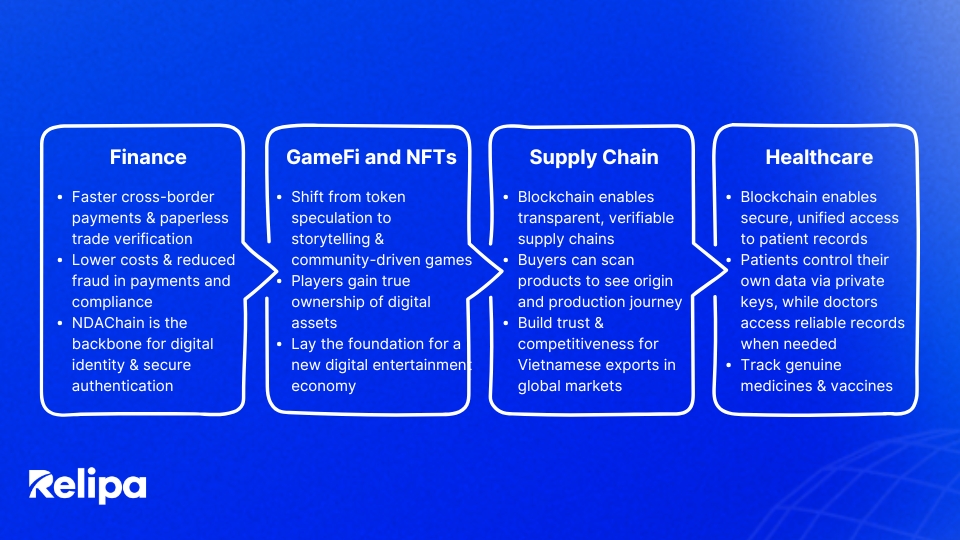
Finance
Imagine sending money across borders in seconds, or verifying trade documents without piles of stamped papers. That’s the promise blockchain is beginning to unlock in Vietnam’s financial industry. With digital banking and mobile wallets already part of daily life, the country is now exploring how distributed ledgers can cut costs, speed up settlements, and reduce fraud in everything from payments to compliance.
Da Nang’s fintech sandbox has become a testing ground for this shift. The Basal Pay project, for example, lets users convert digital assets into “đồng” with fees far lower than traditional systems. At the national level, NDAChain lays down the backbone for digital identity and secure authentication. These are not distant experiments, they are the early steps toward a financial system where transparency and trust are built into the infrastructure.
GameFi and NFTs
Few stories illustrate Vietnam’s blockchain potential better than Axie Infinity. What began in a Ho Chi Minh City studio turned into a global phenomenon, providing that Vietnamese talent could compete on the world stage in the emerging Web3 economy. That success sparked a wave of local GameFi experiments and NFT projects, each chasing the idea that players could truly own and earn from their digital experiences.
The hype may have cooled, but the foundation remains. Developers are now shifting focus from quick token gains to games built on stronger storytelling and community engagement. For player, blockchain is no longer just a ticket to “play-to-earn”, but a way to ensure their digital assets, characters, items, and even art have value and provenance. Vietnam is quietly rewriting how entertainment and ownership intersect.
Supply Chain and Logistics
Every coffee bean, shrimp shipment, or textile roll leaving Vietnam carries a story, and blockchain is turning that into something visible and verifiable. Instead of stacks of paperwork and trust based only on labels, exporters can now let data itself speak. Every scan of a code becomes a window into the journey of coffee beans, seafood, or textiles, showing buyers exactly where and how they were produced.
The NDATrace system, part of the national blockchain platform, assigns unique identifiers that meet global GS1 standards. That means a buyer in Europe can scan and trace a Vietnamese product back to its farm or factory. This kind of transparency strengthens trust and positions Vietnam as a source of goods that are not only high-quality but also fully verifiable in a global market that values proof as much as promise.
Healthcare
In hospitals, the promise of blockchain looks very different but just as urgent. Patient records are often scattered across clinics, making continuity of care difficult and raising risks for privacy. By placing data on secure, decentralized ledgers, patients could hold the keys to their medical histories, while doctors access trustworthy information when it matters most.
Early pilots by the Vietnam Blockchain Corporation (VBC) show how this might work in practice, with patients updating records via private keys and hospitals using the system to assign doctors or track treatments. Beyond records, the technology is being applied to the movement of medicines and vaccines, ensuring they are genuine and properly stored.
What’s Ahead for Blockchain in Vietnam
Greater regulatory clarity
Vietnam is expected to continue refining its legal framework for blockchain and digital assets. The new Law on Digital Technology Industry is paving the way for clearer definitions of crypto assets, rules for exchanges, taxation, and liability. With over 21.2 million Vietnamese adults (around 21% of the population) owning or using digital assets in 2024 (Tiger Research, 2025), regulatory clarity is no longer optional, it is essential for safeguarding users and enabling sustainable growth.
Expansion of national infrastructure
Government-backed platforms are also scaling up. NDAChain, launched in 2024, already operates with 49 validator nodes and a throughput of around 3,600 transactions per second (TodayQ, 2024). The platform is set to be fully integrated into the National Data Center in 2025 and expanded to provinces and universities by 2026.
More public-private partnerships
The blockchain ecosystem in Vietnam now includes over 200 active projects, from GameFi and supply chain solutions (Binance Research, 2023). To move beyond pilots, stronger collaboration between government agencies, startups, and universities will be critical. Regulatory sandboxes, such as Da Nang’s pilot for blockchain-based payments, showcase how joint initiatives can balance innovation with compliance. Universities are also beginning to integrate blockchain into curricula, helping close the talent gap.
Emerging use cases
Blockchain’s role will likely grow in e-government services, land registries, real estate, and environmental monitoring. For example, the supply chain finance market in Vietnam, projected to grow at 10.96% CAGR from 2024 to 2030 (BlueWeave, 2024), highlights the demand for transparency tools in logistics and trade. Meanwhile, blockchain-based carbon credit tracking or green energy monitoring could align with Vietnam’s sustainability agenda, creating new opportunities for innovation.
Increased integration with other technologies
Blockchain will increasingly converge with AI, IoT, biometrics, and zero-knowledge proofs. These integrations are not just buzzwords, they directly address today’s pain points of scalability, privacy, and user trust. With the blockchain market in Vietnam valued at USD 350 million in 2023 and projected to grow at 17.4% CAGR through 2029 (TechSci Research, 2023), such synergies could accelerate adoption and help Vietnam become a regional leader in digital innovation.
Conclusion
Vietnam’s blockchain story is still in its early chapters, but the momentum is unmistakable. What sets Vietnam apart is not just its youthful digital population or cost-competitive talent pool, but the willingness of government, businesses, and communities to experiment and adapt.
The road ahead will not be without obstacles, regulatory complexity, talent shortages, and security concerns remain real challenges. Yet with a market already valued at USD 350 million in 2023 and expected to grow at double-digit rates in the coming years, the opportunity is too big to ignore. Banks, logistics providers, and healthcare institutions are already testing practical applications, while GameFi and NFT projects continue to attract regional attention. Government initiatives like the National Blockchain Strategy and NDAChain give the ecosystem more structure and direction. The coming years are likely to see Vietnam positioning itself as one of Asia’s most active blockchain hubs.
Get in touch with Relipa for more insights about blockchain technology!

